

Vermicomposting for Beginners - Rodale Institute. This article is an excerpt from Rodale Institute’s “A Simple Guide to Vermicomposting.”
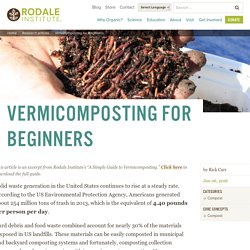
Click here to download the full guide. Solid waste generation in the United States continues to rise at a steady rate. According to the US Environmental Protection Agency, Americans generated about 254 million tons of trash in 2013, which is the equivalent of 4.40 pounds per person per day. Yard debris and food waste combined account for nearly 30% of the materials disposed in US landfills. Vermicomposting 101: How to Create & Maintain a Simple Worm Bin ~ Homestead and Chill. Starting a worm bin is one of the best steps you can take in your gardening journey.

It may not look like much, but a simple little worm bin is one of the driving forces of life and health on our homestead! When people ask how or why our garden is as lush and healthy as it is, I blame the worms. Vermicomposting (the term for composting with worms) is hands-down my favorite method of the four types of compost we utilize. Pros and Cons of Vermicomposting.
Conventional hot composting is a relatively fast process which is followed by a slower process in which the compost goes through a finishing step.
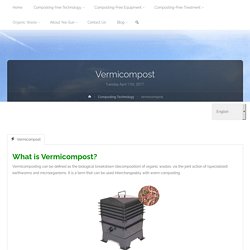
Vermicomposting also consists of two steps, one inside the worm, followed by a slow maturation process. Compared to hot composting it is a slower process. Vermiculture - Appropedia: The sustainability wiki. Vermiculture, or worm farming, is the utilization of some species of earthworm such as Eisenia fetida (commonly known as red wiggler, brandling, or manure worm), E. foetida, and Lumbricus rubellus to make Vermicompost (aka Worm Compost, Vermicast, Worm Castings, Worm Poop, Worm Humus or Worm Manure), which is a nutrient-rich, natural fertilizer and soil conditioner, which is the end-product of the breakdown of organic matter.
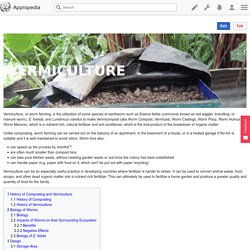
Unlike composting, worm farming can be carried out on the balcony of an apartment, in the basement of a house, or in a heated garage if the bin is suitable and it is well maintained to avoid odors. Worm bins also: can speed up the process by months[1]are often much smaller than compost binscan take pure kitchen waste, without needing garden waste or soil once the colony has been establishedcan handle paper (e.g. paper with food on it, which can't be put out with paper recycling) History of Composting and Vermiculture[edit | edit source] Fig 1. Vermi-composting - Permaculture Design Course Handbook. Written by Karsten Hinrichs Edited and contribution from Doug Crouch With a continuous production of food scraps and waste in the kitchen, there is need for a small and slow solution element too deal with this energy cycle.
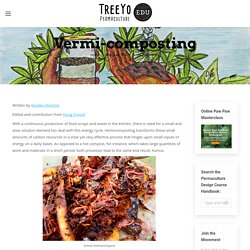
Vermicomposting transforms these small amounts of carbon resources in a slow yet very effective process that hinges upon small inputs of energy on a daily bases. Flies in Worm Compost - Allotment & Gardens. Guides to Making Worm Compost “I enjoy using my vertical worm compost bin – and have many thousands of worms now working away at our daily garbage refuse – but we also seem to be harboring many more thousands of tiny fly larvae – I’ve tried covering with several layers of wet newspaper, used coffee filters, and egg shells, but the top few bins seem to be real magnets.

Help!” ~ Diane from Detroit I understand your pain with flies in vermicomposting and I am sure it is a big problem with many people out there. Unfortunately having flies is part of a normal composting process, but there are ways to minimize the problem. Vermicomposting Food Scraps In Resource Recovery Park. April 20, 2021 | Collection, Compostable Packaging, Composting, Food Waste New company in Geneva, New York provides opportunity for households and businesses to recycle source separated organics.
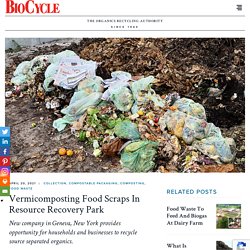
Top: Feedstocks are mixed and precomposted in passively aerated static piles inside the fabric structure. Nora Goldstein. What’s in the Worm Juice? – The Garden Professors™ A couple of weeks ago I mentioned that I would be taking a look at the leachate that comes from vermicompost.
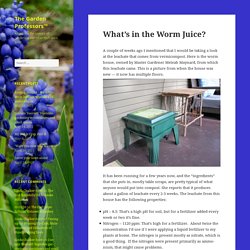
Here is the worm house, owned by Master Gardener Meleah Maynard, from which this leachate came. This is a picture from when the house was new — it now has multiple floors. It has been running for a few years now, and the “ingredients” that she puts in, mostly table scraps, are pretty typical of what anyone would put into compost. Worm Compost Leachate, Good or Bad? There are a few things going on with leachate.
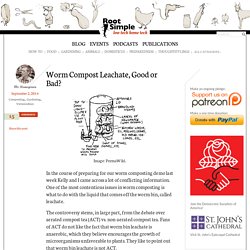
Obviously the makeup of leachate varies depending on the worm farm, but typically you would expect leachate to be mostly anaerobic. If you smell your leachate, and it smells bad, one would expect that anaerobes are dominating. On top of this, the pH of the solution will depend on the contents being added to the worm farm, but that’s difficult to assess. If you have “fresh” leachate, you will expect there to be a high concentration of microbes still contending for the nutrients available in the oxygen poor environment of the leachate.
Worm Bin Acidity: Best pH for Composting with Worms - Uncle Jim's Worm Farm. Successful composting with worms involves keeping the worm bin low-odor and safe for the worms.
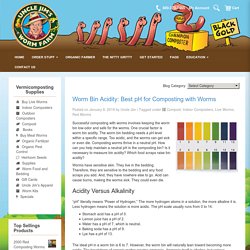
One crucial factor is worm bin acidity. The worm bin bedding needs a pH level within a specific range. Too acidic, and the worms can get sick or even die. Composting worms thrive in a neutral pH. How can you help maintain a neutral pH in the composting bin? Using Coffee grounds for Vermicomposting - Uncle Jim's Worm Farm. When you’re sipping your favorite cup of coffee (whether you had some brewed at home or had ordered a cup from your favorite coffee shop), did you ever wonder where these things go afterwards?
Well coffee grounds can still be quite useful. Besides having to use it as part of your skin and hair regimen, or as a soil and garden supplement, you can also use these as food for your compost worms. You can read through this article to find out more about the benefits of this essential ingredient. Do Worms Eat Coffee Grounds? You Bet They Do! Coffee grounds are organic in matter, which makes it a perfect food source for worms. Yet, too much of a good thing always has the risk of throwing the conditions in your worm bin off kilter. This can hurt your worms. The answer to the question “do worms eat coffee grounds?”
Is Yes, … but not all the time. : Vermicomposting. Guide H-164 Revised by John Allen College of Agricultural, Consumer and Environmental Science, New Mexico State University Author: County Program Director, Hidalgo County Extension Office, New Mexico State University. Vegetable Seedling Diseases Associated with Earthworm Castings Contaminated with Phytophthora capsici and Pythium attrantheridium. Vegetable Seedling Diseases Associated with Earthworm Castings Contaminated with Phytophthora capsici and Pythium attrantheridium Bo Liu, Department of Plant Pathology, West Central Research and Extension Center, University of Nebraska-Lincoln, North Platte, NE 69101-7751; Debbie Roos, Chatham County Center of North Carolina Cooperative Extension, Sanford, NC 27330; and Shawn Buttler, Brantlee Richter, and Frank J. Louws, Department of Plant Pathology, North Carolina State University, Raleigh, NC 27695-7616 Corresponding author: Bo Liu. bliu5@unl.edu.
Vermicompost - Is It Really That Great? - Garden Myths. Vermicomposting is a popular way of getting rid of kitchen scraps and proponents of this form of composting make all kinds of claims. Does vermicomposting really work? Does it produce a superior compost when compared to traditional bin composting or Bokashi? What do the worms actually produce and how does it compare to traditional compost? This post will have a close look at vermicomposting and compare it to bin composting. Vermicomposting Yard Wastes. The Vermicomposting Trench. Interview With Tom Herlihy – Worm Power. Worm Power. VermBin Series Plans Package – Just another WordPress site.
Worm Composting Canada. RE:View. Worm Composting Videos.